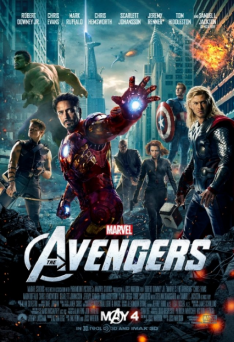Print Edition: May 9, 2012
 Joss Whedon might seem the logical choice to helm The Avengers for, based on his intermingling television productions and his recent attempt to see through the horror genre, accumulated narrative is what he gravitates to. The Avengers franchise has taken up five movies to build to this cumulative production moment, but for Whedon, that means the weight of expectation and commitment to prior work in the series takes precedent over whatever signature writing style or narrative leaps might be expected given his repertoire.
Joss Whedon might seem the logical choice to helm The Avengers for, based on his intermingling television productions and his recent attempt to see through the horror genre, accumulated narrative is what he gravitates to. The Avengers franchise has taken up five movies to build to this cumulative production moment, but for Whedon, that means the weight of expectation and commitment to prior work in the series takes precedent over whatever signature writing style or narrative leaps might be expected given his repertoire.
No more is this clear than in how The Avengers begins, with re-introductions to allow for newcomers and reminders of movies better left forgotten for those who saw these same characters summers ago. Captain America: The First Avenger is reduced to a six shot flashback, showing all that movie was ever meant for, and Tony Stark (Robert Downey Jr.) is brought up to speed by a series of screens showing snippets from the other introductory blockbusters. A single shot was all Whedon needed in Serenity.
Duty, soldiering, ideals of the past and present are brought up and like all of the mindless tête-à-têtes turn out to be diversions from the real stakes, so the question is why this conglomerate of solid principles feels the need to dabble in questions it has no interest in bringing to any sort of conclusion. Weapons of mass destruction and clean energy appear and vanish like the buzzwords they are. If there’s any flicker of life in the extended sequences of arms-crossed deliberation and bickering, it’s in the anachronistic, foreign, and reclusive charms of Captain America (Chris Evans), Thor (Chris Hemsworth), and Bruce Banner (Mark Ruffalo), who due to the crowded nature of the hero meet-up are only given a scene or two that isn’t tethered to the progression of plot and the spitting out of comic book jargon.
Narrative slog involving reheated plot details from almost every mega-movie of the past decade aside, once The Avengers gets going it is the end of the superhero world spectacle it sets out to be, with one continuous shot showcasing each action idol at their most pose-worthy, summing up why this movie exists. Further orchestrations fulfill their duty by showing everyone involved dancing out of scrapes and into revivals of fan favourite moments.
The problem is that in its culminating flashes and climatic rescues, The Avengers is throughout a prolonged introduction. It’s the same story a decade into the rejuvenation of comic book interest, making this the least varied of all the genres. We’re forever being teased about the next installment, with hints at future relationships and building of character that won’t be on full display until the next one, which might but probably won’t break the cycle of the same tired narrative we see here. For all its CGI glory, it can’t resist the same pointless ending and beginning anew of hero-villain relationships. Whedon is just another link in the chain, continuing a growth that isn’t selective or purposeful besides stretching into infinity.
“What happens if we get into a situation like this again?” As if there’s any doubt, Samuel L. Jackson’s Nick Fury’s response is “They’ll come back again. Because we need them to.” A pan across a series of monitors records the aftermath of public opinion in the minutes following the Avengers saving the day. You too can adopt one of these viewpoints: concerned parent, jubilant fan, aloof unbeliever, converted follower, reassured citizen craving consistency. They all owe it to the great acts of the realm-spanning heroes, grateful in any case to be saved. Why do they prefer them to the subjugating doctrine of the villain of the piece (Tom Hiddleston)? “It’s in your nature.” Or at least, they’d like to keep it that way.


